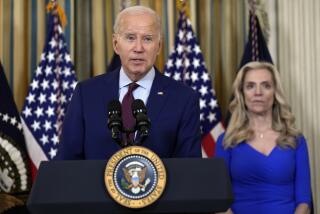Bush Expected to Seek Easing of Antitrust Laws : Economy: An Administration official said the President wants to let companies open joint assembly lines.
- Share via
WASHINGTON — President Bush will ask Congress today to relax antitrust laws so that U.S. firms may participate in joint ventures and better compete in the global economy, a senior Administration official said.
She said the new law, long sought by U.S. business, would allow firms to open joint assembly lines without facing the threat of triple damages if their actions were found to be anti-competitive.
The official said the proposal, spearheaded within the Administration by Commerce Secretary Robert A. Mosbacher, would bring U.S. high-technology production more in line with Japan and Western European practices.
“Our high-tech companies are competing globally, not just in this country, but against Japan and Germany,” said the official, who asked to remain anonymous. “This is vital for our companies to compete.”
Joint production of high-definition television would be one area likely to be taken up by U.S. businesses, officials say, in an effort to overcome Japan’s lead in producing television with motion-picture quality.
“The costs of developing many items on the new technology agenda and bringing them to the marketplace often exceeds the resources of a single firm,” said Rep. Don Edwards (D-Calif.), when he introduced a proposal to relax antitrust laws last year.
The Administration official said Bush might introduce his own bill, or he might back a bill already pending, such as the one backed by Edwards or one in the Senate offered by Democrat Patrick J. Leahy of Vermont and Republican Strom Thurmond of South Carolina.
Senate Judiciary Committee chairman Joseph R. Biden of Delaware will back the Leahy-Thurmond bill, his aides said.
Congressional observers say there is little doubt that a measure will pass once the idea gets Bush’s stamp of approval.
Eased antitrust treatment for industrial production is seen by industry as a logical extension of a 1984 law that relaxed antitrust regulations to allow joint research and development.
“Many (research and development) ventures are now at a point where it makes sense to extend the law,” an industry official said.
Generally the bills submitted would allow firms to request federal permission to begin joint production arrangements. If no legitimate objections arose, they could go ahead with their plan free from the threat of triple damages, a daunting penalty contained in present antitrust laws.
The bills also would preclude the government from taking antitrust action once it had approved the venture. Only private firms could sue and then only for actual damages.
President Reagan had wanted the legislation, but there was strong opposition within his Administration, as there had been within the Bush Administration.
More to Read
Inside the business of entertainment
The Wide Shot brings you news, analysis and insights on everything from streaming wars to production — and what it all means for the future.
You may occasionally receive promotional content from the Los Angeles Times.










